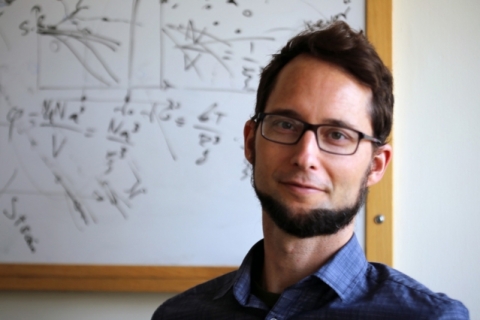
Date:
Location:
Speaker:
Bio-inspired metal-coordination crosslinking: easy access to broad dynamics when engineering polymer gel mechanics
Efforts to engineer polymer hydrogel mechanics is increasingly coupled to the design of transient crosslink dynamics. We have sought to gain a deeper understanding of how polymer gel mechanical properties can be controlled over multiple hierarchical time-scales via design of bioinspired metal-coordinate crosslink structure on multiple length-scales. By utilizing metal ioncoordination complexes and metal nanoparticle-coordination junctions as supra-molecular crosslink structures, we have gained unique access to network dynamics on the microscopic scale, and thereby opportunities to broadly shape the distribution of network stress relaxation on
the macroscopic scale. Our findings offer deeper insights on how to engineer gel stress relaxation mechanics directly via design of supramolecular crosslink structure dynamics, and could help improve our understanding of spatio-temporal molecular hierarchy in loadbearing biological materials.
BIO Sketch | Niels Holten-Andersen obtained a B.S. in Molecular Biology from University of Copenhagen, a B.S.Hon. in Molecular Genetics from University of Canterbury and a M.S. in Cell Biology from University of Copenhagen. He then conducted his PhD studies at University of California, Santa Barbara with Prof. Herbert Waite, where he focused on elucidating the material design principles underlying the mechanical energy dissipative properties of the underwater adhesive fibers of mussels. After obtaining a Postdoctoral Fellowship from the Danish Council for Independent Research, he conducted research on incorporating such mussel-inspired material design principles into synthetic polymer platforms at University of Chicago under the guidance of Professor Ka Yee Lee. Since 2012 he has been an Assistant Professor in the Department of Materials Science and Engineering at MIT, where he holds the Doherty Professorship in Ocean Utilization, and he is a member of the MIT Program for Polymers and Soft Matter (PPSM). He has received the ONR Young Investigator Award and the 3M Non-Tenured Faculty Award. The Laboratory for Bio-Inspired Interfaces is focused on the employment of design principles extracted from nature in the development of synthetic materials with novel properties. One specific area of interest lies in the utilization of stimuli-responsive metal-coordinate crosslink dynamics to control polymer material mechanics.



